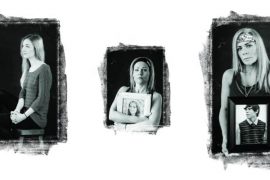CULTIVATING RESILIENCE
BOUNCING BACK FROM LIFE'S CHALLENGESBy Shilagh Mirgain
“Don’t you quit on me,” says coach Leo Morel at Canvas Club Boxing. “Don’t you give up. You don’t have to be nice. I know you are upset about something; find that energy and punch it out. That’s it. Keep punching it out.”
Morel is coaching a diverse group of women who are stationed around various punching bags. Each accesses what’s bothering her, and with each punch releases and transforms it. These women are taking back their power with each punch. They are training in resilience. It’s something we can all cultivate, this capacity to quickly bounce back from adversity.
Resilience allows us to stay strong and in balance in the face of life’s challenges.
Women are like water, our ideas, creativity and actions need to be constantly fluid and in motion. We are receptive, take in events from life and experience emotions that rise and fall like waves. We assimilate and integrate our experiences and then take action from this place of wisdom.
But the difficulties of life can be a harsh awakening. Pain will come. It often causes our energy to constrict and creates blocks and restrictions in our self-expression. If we’re not taught how to meet life and stay resilient in the midst of the problems we face, our confidence weakens. We hold onto things that aren’t ours to hold onto and give away our power. We can become stagnant, and if we freeze up, we dam up our potential. Having practices in place to protect our life force keeps our sense of self flowing strong.
No one knows this better than Melissa Ernst, who co-founded Canvas Club a year ago after falling in love with boxing as a workout of empowerment, a way to build confidence and as a training ground for life. She wanted to create a space in Madison that attracted a variety of people interested in the physical and mental benefits of boxing, without the contact and grittiness of the sport.
Since opening the gym, she’s had girls as young as 8 and women into their 70s learn the art of boxing. She reflects, “When women step into the ring, they are often out of their comfort zone. They are going to make mistakes and have to try again and again to get a combo sequence right. Nothing comes easy in boxing. And let’s face it, life is the same way. Life is not easy and you are going to get hit and fail. You are going to get knocked down; you can choose to let them knock you out, or you can learn how to get back up and figure out how to make your next move. Practicing resilience in the ring can be a great way to prepare for what punches life throws you and the next steps you take forward.”
Ernst says she developed resilience thanks to parents who believed in her and challenged her to do things that might end in failure. Those lessons changed the trajectory in her life. She now is also pursuing a master’s degree in health psychology to continue to learn the importance of resilience and other ways to connect the mind and body.
When life gets us down and we are stuck in the muck, how can we learn to pick ourselves back up? It is not by paralysis of analysis. Women are vulnerable to rumination and can spend too much time in their heads hooked by thoughts of upset. We can free ourselves by first feeling what is needed to heal. Allowing and making space for expressing all of our emotions and reactions is the alchemy that transforms upsets into wisdom.
Research shows that when people suppress their emotions, they have a diminished sense of wellbeing and feelings that are ignored will erupt often at the worst time. Women are often conditioned to feel sadness and anxiety but to suppress anger. But anger is a great motivator and at its core is our personal power. It is a signal that something’s happening that’s not in our best interest. The energy of anger can be a catalyst for speaking up, setting boundaries and limits and negotiating for change. Boxing and other forms of exercise are one way to safely express and process emotions so we can think more clearly about best next steps.
Resilience is also strengthened through learning life’s lessons. We all have a personal narrative, one that shapes our view on life and ourselves but sometimes our perspective isn’t completely accurate. Putting our experiences on paper through therapeutic journaling helps us identify thought patterns that don’t serve us. We can rewrite our wrongs by reflecting on what our difficulties teach us, and how we grow and make meaning from mistakes, missteps and misfortunes. We can then write our way to a new ending, one in which we’re the heroine making positive changes in our own life’s story.
Ernst had to redefine what failure meant to her as a female business owner. “We are all going to fail and make mistakes; we are human, but when you can take those mistakes and learn and grow from them you come out a better person who is equipped for new challenges,” Ernst says. “I have learned to find ways to grow through every experience I encounter. My first business venture was a vintage boutique. After a year of business, I decided that it was not where my passion was and it was not a viable business. That year was the best education I could have asked for and I didn’t lose my entrepreneurial spirit from that business failure. I saw it as a stepping block and learning experience that allowed me to get to where I am today.”
Ernst also has found that community is key. “There are so many talented women business leaders in Madison. I make sure to surround myself with other business owners and mentors who can encourage me when I come across an obstacle or when something doesn’t go as planned.”
We all need a circle of support we can turn to regularly for strength. There is a certain kind of protection that comes from a deep sense of being loved and valued. The Zulus have a greeting, “Sawubona,” that translates roughly into “I see you, and by seeing you I bring you into being.” People who see past our limitations, our weaknesses, our vulnerabilities to our larger potential are the companions for life. What they mirror back to us helps us see past our struggles for today and shows us the hope for tomorrow.
Ernst says, “The most important way I promote resilience in my own life is through serving and sharing God’s love. Learning to put others before yourself changes the way you live. Understanding that there are others around me who need support and seeing how they come through tough times encourages me to keep going.”
And that is the treasure we find after growing through difficult times into greater resilience. We remember who we are and what we came here to do. We access the part of us that is unhookable, unbreakable and indestructible. We gain a certain kind of tenacity and a sense of wholeness we can use to make a difference by speaking up boldly, taking action bravely and enacting the brilliant changes we wish to see in the world.



